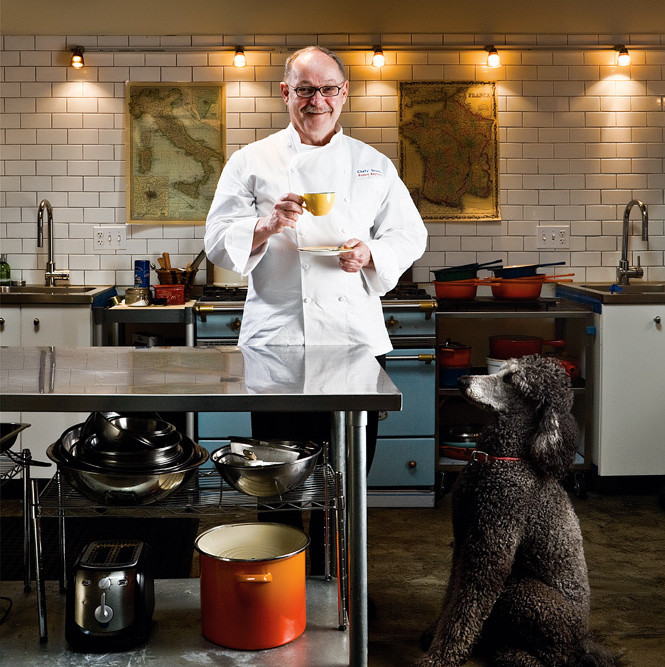In Memoriam: Robert Reynolds

The first time I met the late chef Robert Reynolds he gave me a short lesson on how to cut a duck breast. We were sitting at adjacent tables for the opening night of a tony new west-side eatery. The protein was proudly delivered, but sliced woefully wrong.
Duck is a long-fiber protein, Robert explained. You cut it across the grain—otherwise it’s hard to chew, much less to digest. As my fork split each slice like a rotted wood plank, I instantly understood.
The first time Robert met me, as he liked to tell it, was in his car a few months earlier. It was 1997. I was giving a speech to the City Club of Portland, arguing how Portland needed to strengthen its regional identity through more thoughtful architecture, else the boom of newcomers would gradually erode our sense of place. “What about the food?” he hollered at his radio. “What about the strawberries?”
To Robert, Oregon strawberries—a distinctly more flavorful genus than can be found almost anywhere—are pillars to the region’s gastronomical architecture. Lose them, he feared, and Oregon would become just another bland suburb of Big Agriculture; properly celebrate them, and they could be the icon for the Willamette Valley’s natural wealth. And until he died of cancer in August, Robert lived to inspire broader love for those riches, and a deeper consciousness of how to use them. As he put it, “Oregon is the one place in America with the ingredients to create a regional food culture on a par with France.”
Robert had traveled the world, learning its food by making friends, from the home cooks he hung with while on military duty in Japan to his immersive studies with French cooking icon Josephine Araldo. In San Francisco, he opened a legendary restaurant, Le Trou, serving its first meals from a Coleman camp stove with ingredients gathered on morning motorcycle rides on his BMW between farmers markets and the backyard gardens of friends.
He discovered Oregon in the ’90s and tried on the shoes of the great Oregon-born chef James Beard but with his own Francophile skip. A goal—never realized but gleefully imagined in the occasional tours he offered to friends—was to establish a series of bronze plaques throughout downtown marking places where Beard had worked, shopped, and eaten. He opened a unique entity—the Chef Studio—where he taught classes (often to leading chefs) and held gatherings. He self-published a delightful combo of recipes and reminiscences, An Excuse to Be Together, and cowrote a sumptuous ode to the region’s offerings, The Paley’s Place Cookbook.
But Robert’s most important contributions to the region were also his most ephemeral: the countless conversations with Portlanders from every walk of life. As he seduced us into pleasures of eating well, he gave us a framework for what the flavors could mean, historically, gastronomically, and politically. And in a city with an abject fear of open disagreement or criticism, he was unsparing in his love and opinions. If a trend, a hot restaurant, or a dish didn’t match his philosophy and standards, he blithely flicked it like so much plastic garnish: “This doesn’t belong here,” he would say, flatly, to a wide-eyed chef. But one beat later, he’d gleefully extoll the virtues of a burrito he discovered at a Korean bulgogi stand: “Best thing I’ve had in weeks. Five bucks. They’re just doing it.” If the banter became too trivial at one of his studio gatherings (which might include an advertising guru, a venture capitalist, or the mayor of Portland alongside a stay-at-home mom or a barista who’d just taken a Chef Studio class), he would happily halt the dining and announce, “Can’t we talk about the bigger questions?” And the gathered would.
When lymphoma left him with weeks to live, friends from every facet of Portland culture rallied, with dinners and checks, to send him on “a victory lap” to France and Italy to visit the places and friends who had inspired him to inspire us. He finished the trip, barely, came home, and died within days, in part because he quit eating.
Every dead friend leaves a void, but the loss of the Portland food culture’s BFF is deep. Yes, we are hot, with our restaurants, food carts, wine bars, and coffee shops collectively becoming the kind of tourist destination and creative magnet any city would long for. But the standard Robert Reynolds wanted us to understand had nothing do with that. Mike Thelin, the cofounder of Feast Portland, put it best. In the days leading up to a breathtakingly successful launch of this new event, in which a large contingency of the nation’s leading chefs and food writers converged in Portland, Thelin was asked if he’d considered dedicating the festival to Robert. His response? “We first have to prove we’re good enough.”
